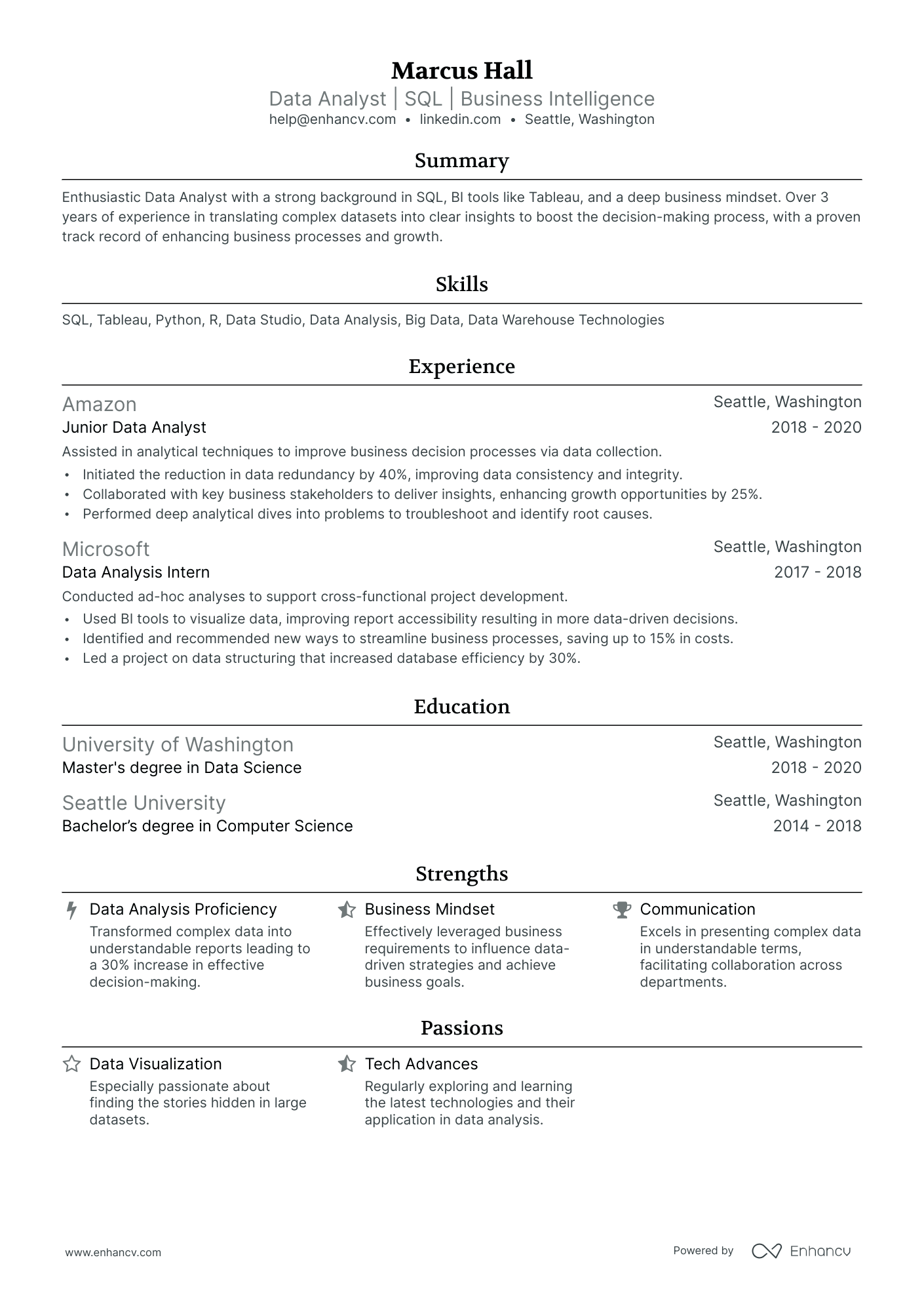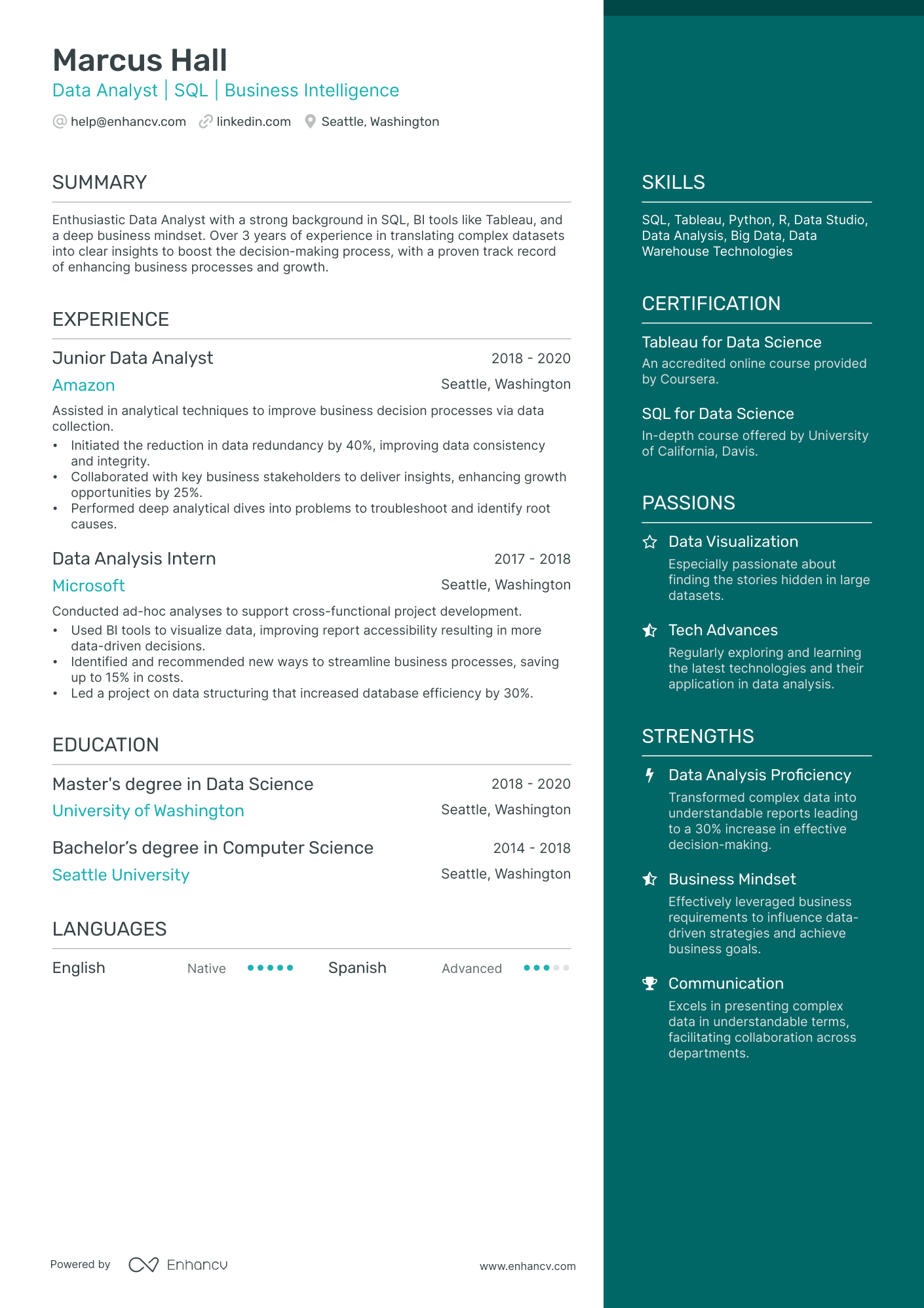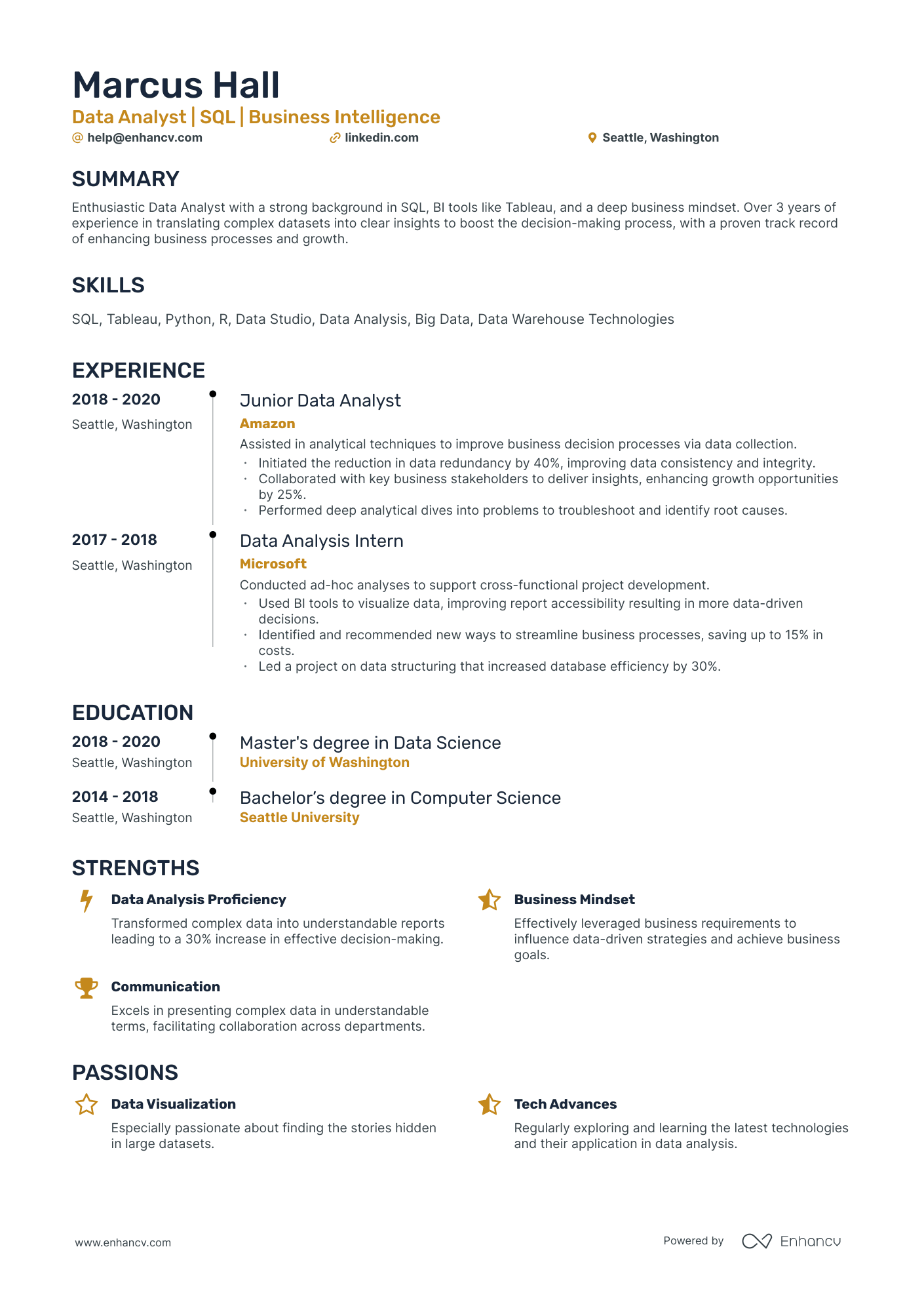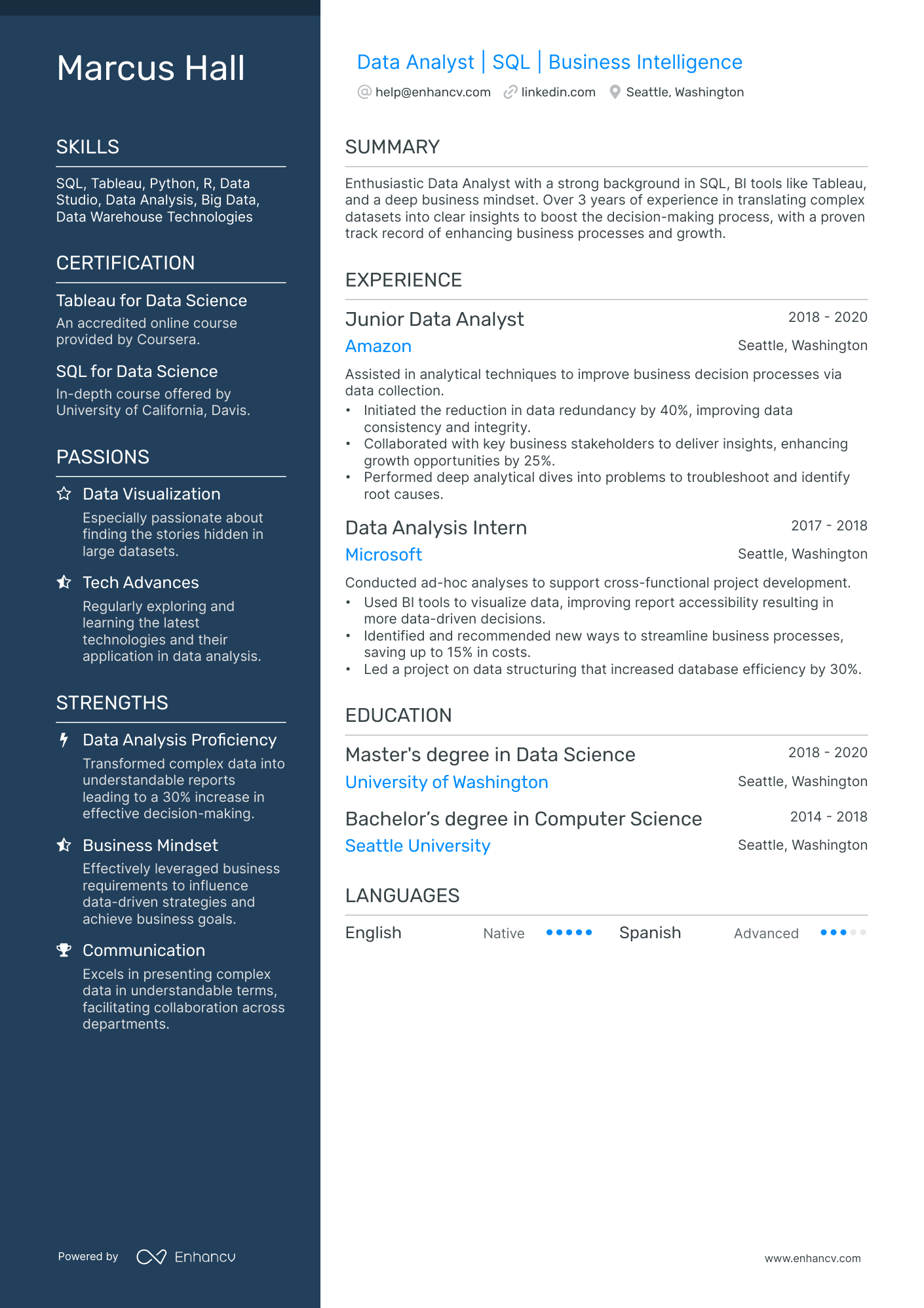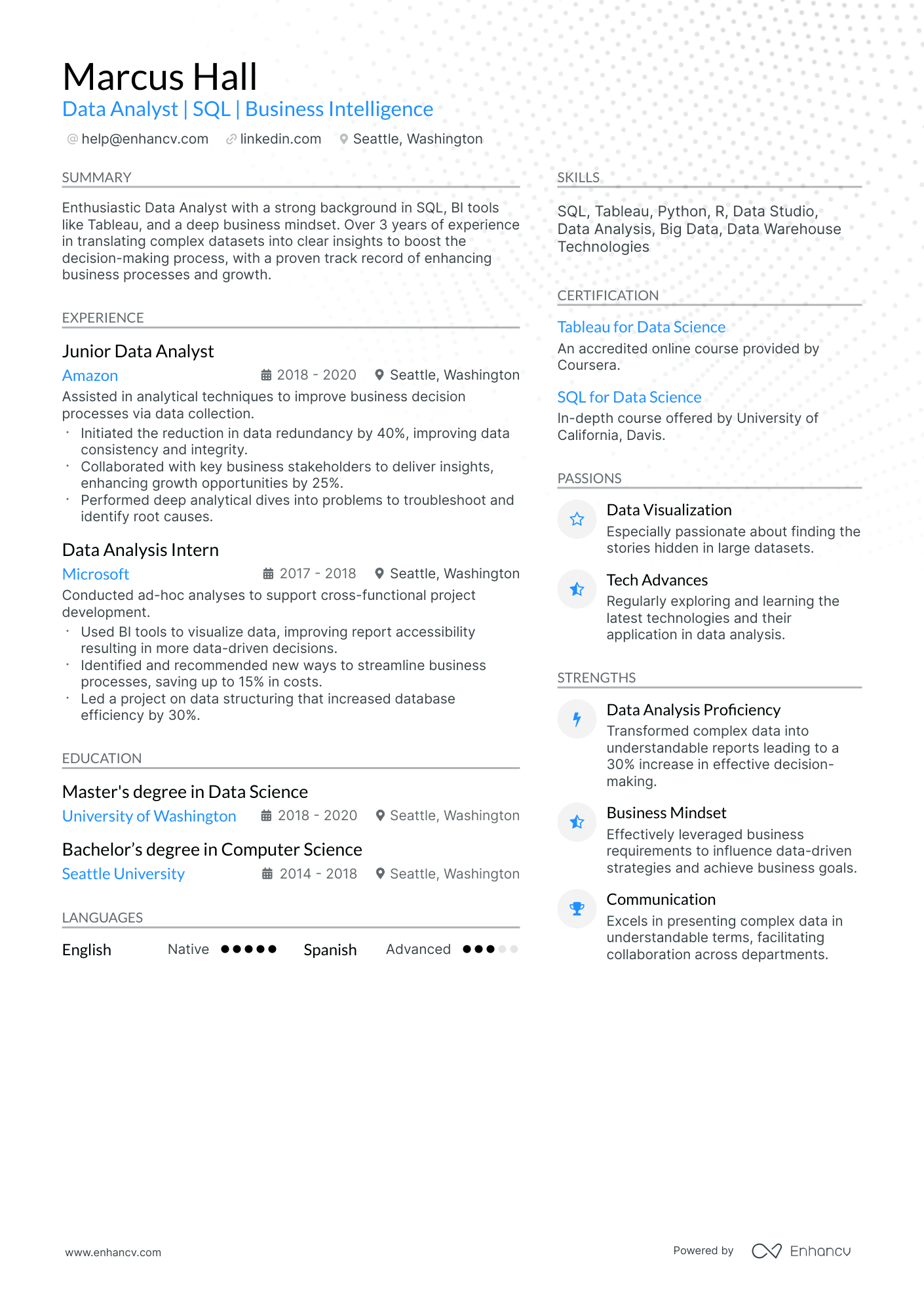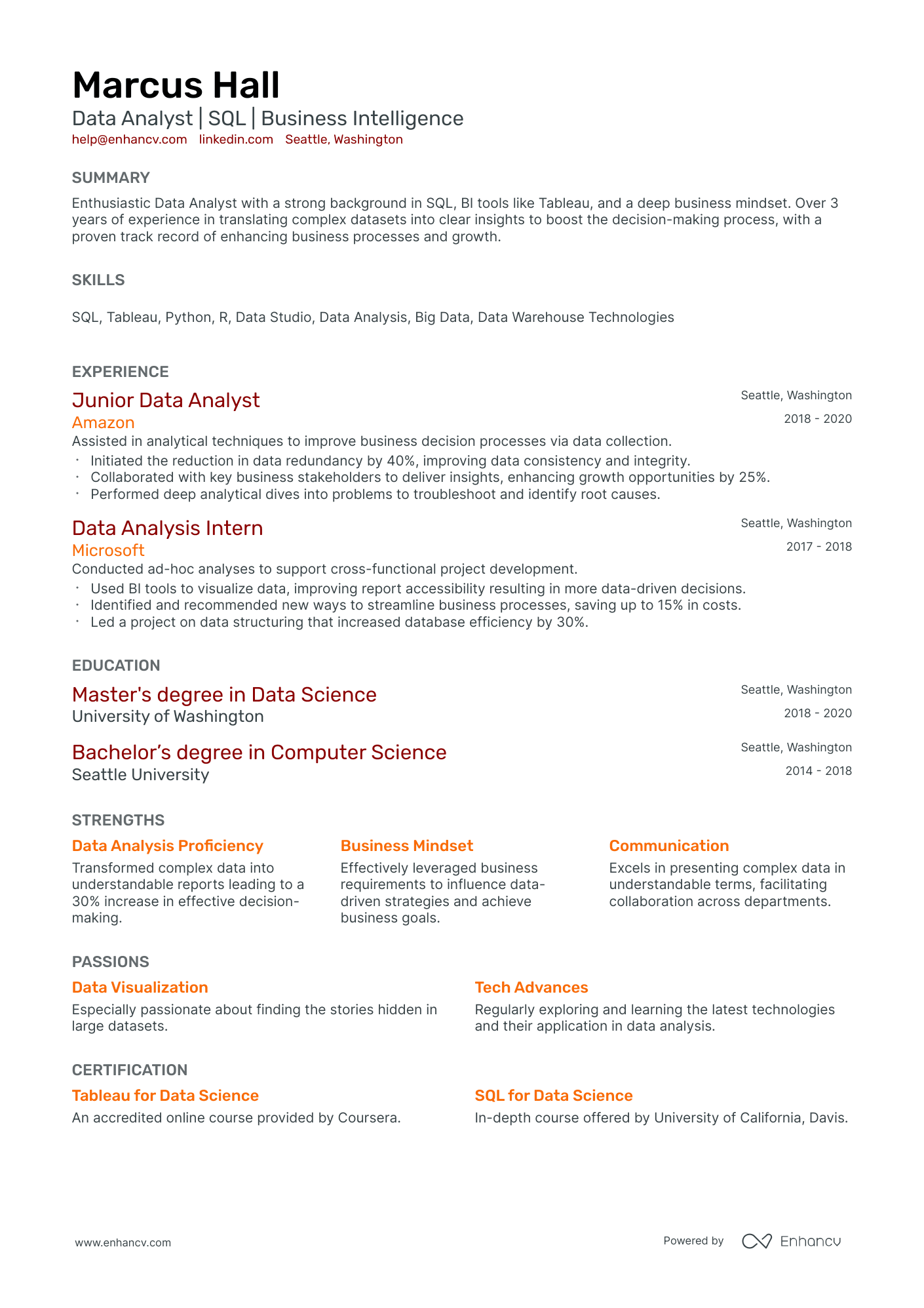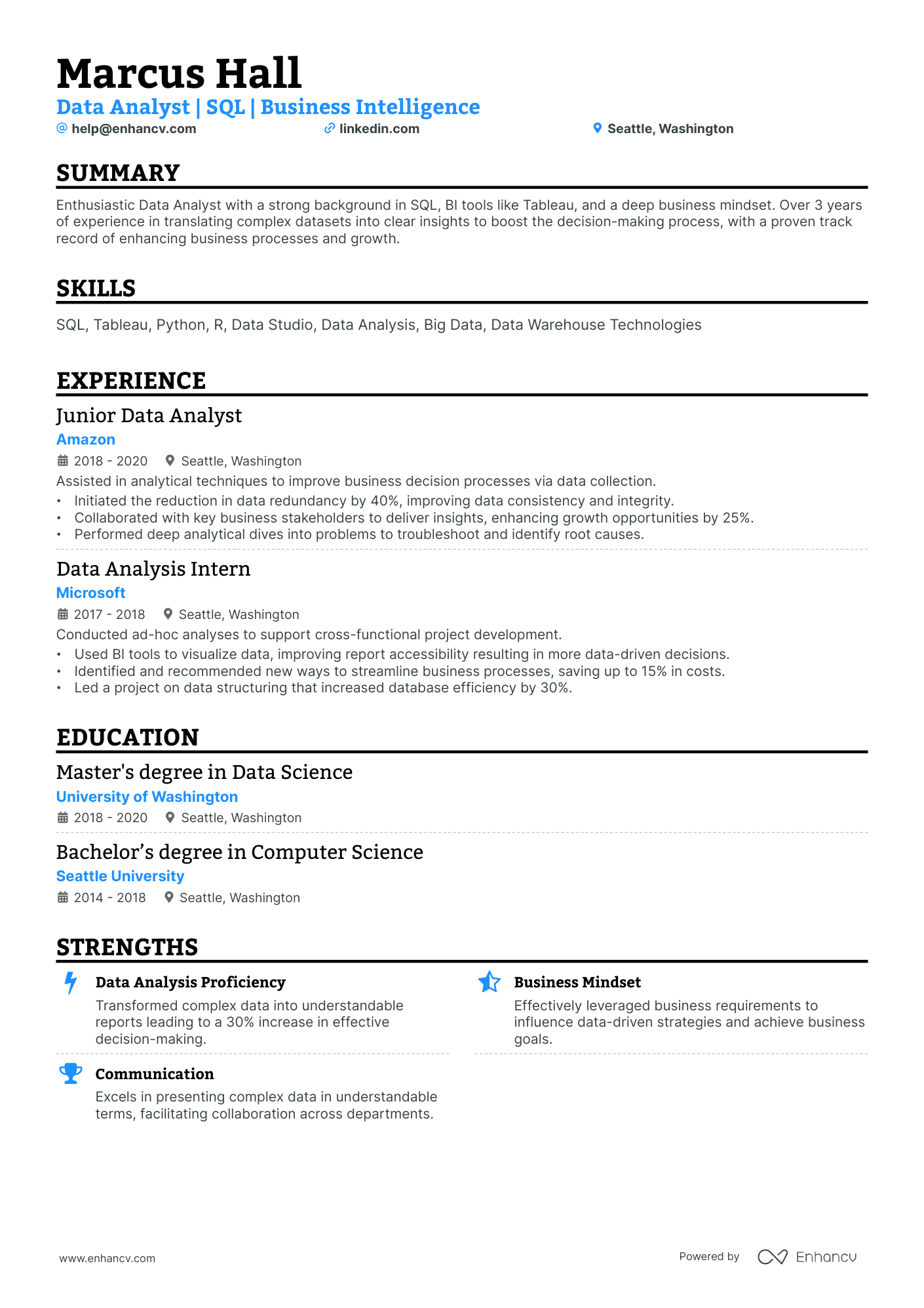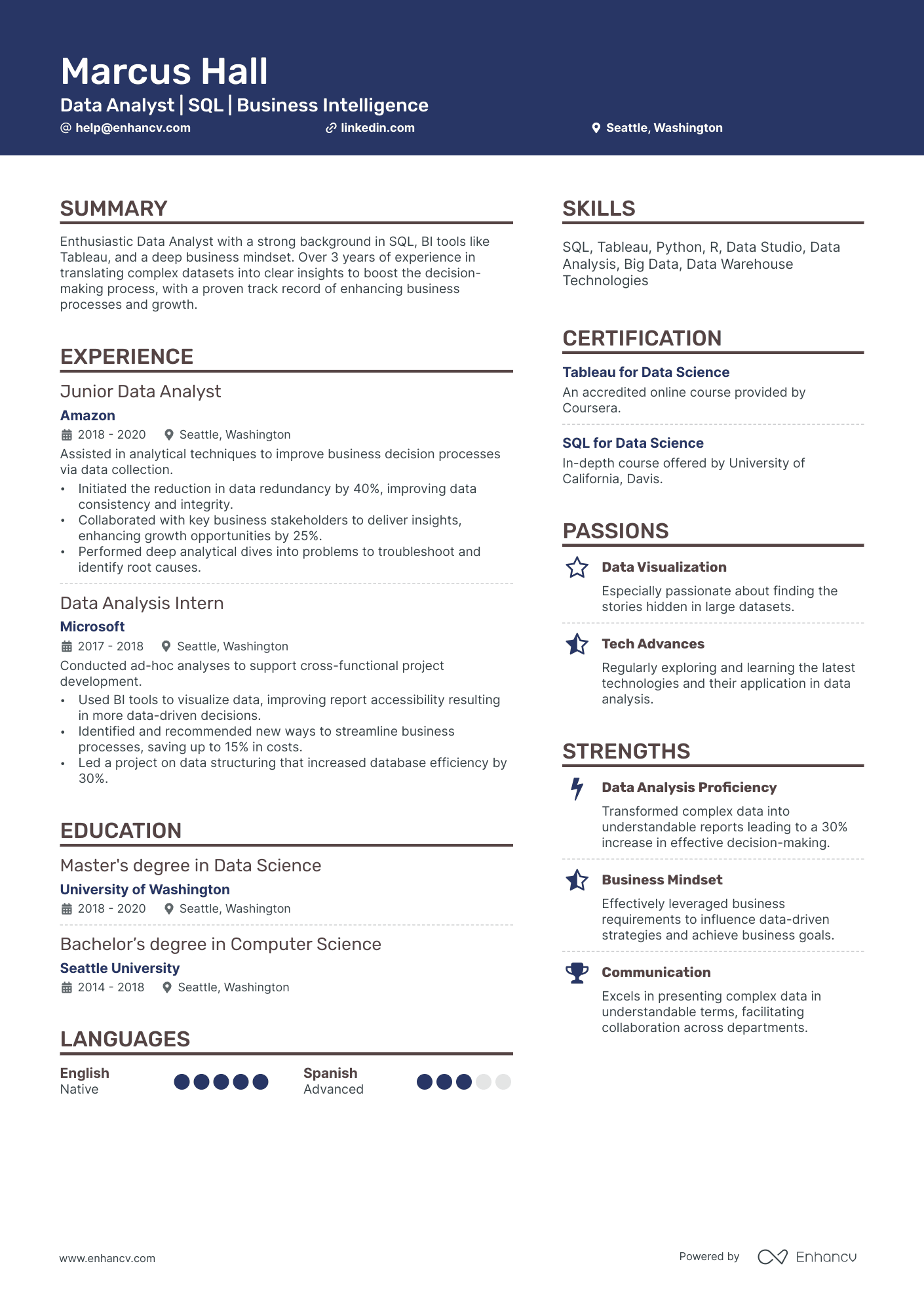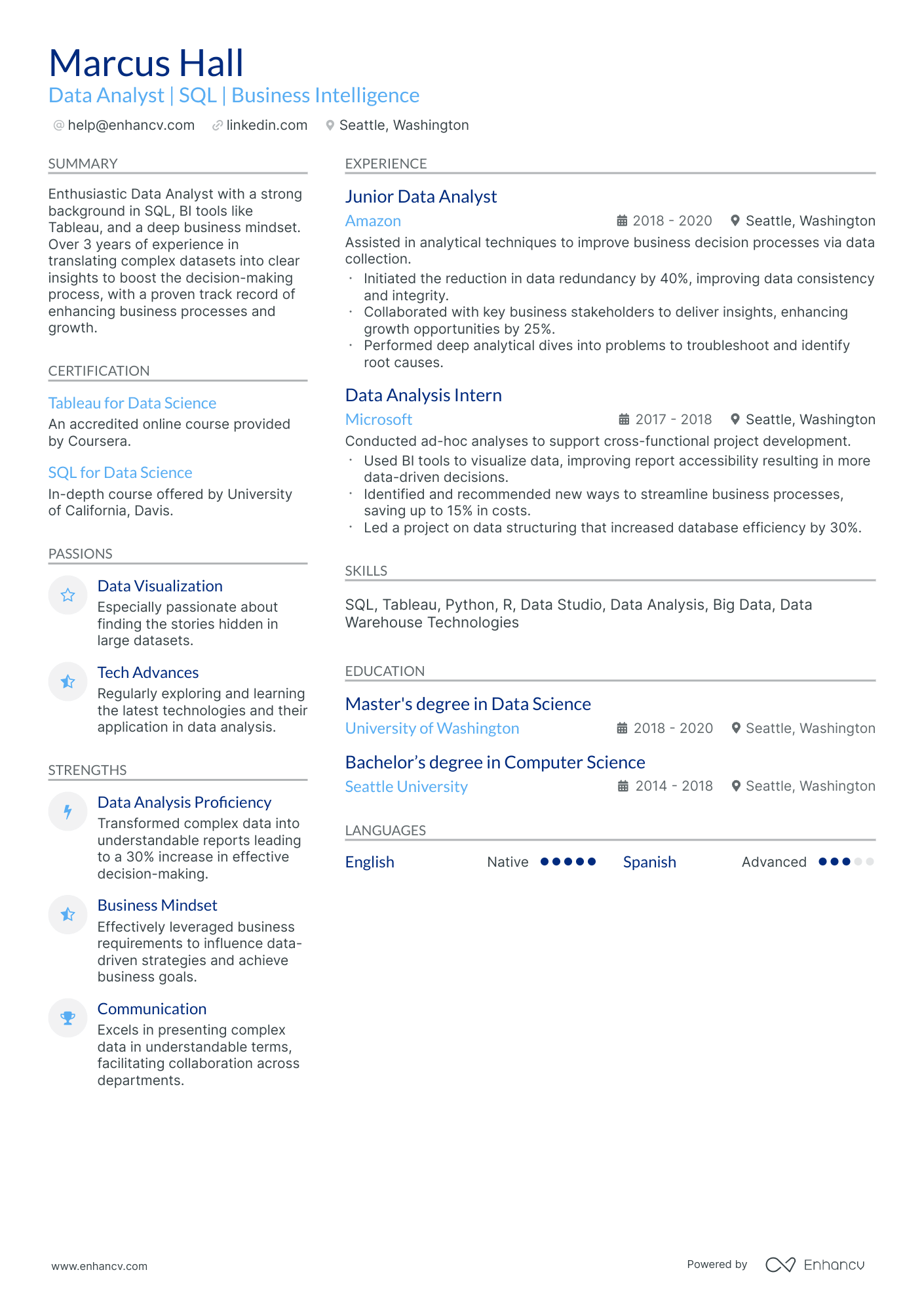One specific resume challenge faced by a data analyst intern is articulating their relevant skills and experiences in data analysis without much professional work history to draw from. Our guide can assist in addressing this issue by providing strategic advice on how to highlight applicable academic projects, coursework, and use of data analysis tools effectively, making their resume compelling even with limited work experience.
Dive into our concise guide to learn how to:
- Show your data analyst intern career's brightest moments through your resume's summary, objective, and experience sections.
- Explore top-notch data analyst intern resume examples to understand how to distinguish yourself from other candidates.
- Identify the most sought-after data analyst intern skills and certifications in the industry.
- Design a structured yet unique resume layout.
Recommended reads:
crafting a stellar data analyst intern resume format
Navigating the maze of resume formatting can be challenging. But understanding what recruiters prioritize can make the process smoother.
Wondering about the optimal format, the importance of certain sections, or how to detail your experience? Here's a blueprint for a polished resume:
- Adopt the reverse-chronological resume format. By spotlighting your latest roles upfront, you offer recruiters a snapshot of your career trajectory and recent accomplishments.
- Your header isn't just a formality. Beyond basic contact information, consider adding a link to your portfolio and a headline that encapsulates a significant achievement or your current role.
- Distill your content to the most pertinent details, ideally fitting within a two-page limit. Every line should reinforce your candidacy for the data analyst intern role.
- To preserve your resume's layout across different devices and platforms, save it as a PDF.
Remember, resume layouts can vary by country – for example, a Canadian resume format could look different.
Upload your resume
Drop your resume here or choose a file. PDF & DOCX only. Max 2MB file size.
Pro tip
If you don't happen to have that much relevant experience for the role, you could select a different format for your resume. Popular choices include:
- functional skill-based resume format - that puts the main focus on your skills and accomplishments;
- hybrid resume format - to get the best of both worlds with your data analyst intern experience and skills.
Essential sections for a standout data analyst intern resume:
- The top section should combine your header—with accurate contact details—and a concise summary or objective that encapsulates your professional achievements.
- An experience section that chronicles your career trajectory and how each role contributed to your professional development.
- Highlight significant achievements that demonstrate the practical application of your skills, leading to tangible results.
- Include industry-recognized certifications to underscore your technical proficiency or interpersonal skills.
- Detail your educational background relevant to the field.
What recruiters want to see on your resume:
- Technical Skills: Familiarity with data analysis tools like SQL, Python, R, Excel, PowerBI, or Tableau.
- Statistical Knowledge: Understanding of statistical principles and methodologies relevant to data analysis.
- Data Visualization: Ability to create compelling and informative visual representations of data.
- Problem-Solving Skills: Demonstrated ability to identify, analyze, and solve complex problems using data.
- Educational Background: Coursework or degrees in relevant fields such as Statistics, Computer Science, Economics, or Data Science.
Recommended reads:
Designing your data analyst intern resume experience to grab recruiters' attention
For the data analyst intern position, it's crucial to show how your expertise matches what they're looking for.
Your resume experience section can be a game-changer. Ensure you:
- Feature roles most relevant to the data analyst intern job you're targeting.
- Avoid diving too deep into ancient history - unless what you did a decade ago is super relevant to the data analyst intern role.
- Structure each bullet to first describe what you did, followed by the skills you utilized, and then the impact of your efforts.
- Quantify your achievements with numbers, possibly highlighting the broader impact on the organization.
- Emphasize transferable skills - those you've gained in past roles that could be valuable in your new role. This showcases your unique professional value.
Crafting the experience section doesn't mean detailing every job you've ever had. Check out the data analyst intern resume samples below to see how top professionals present their experience.
- Performed data cleaning and analysis on large datasets using Python and SQL resulting in improved data accuracy and streamlined processes.
- Assisted in the development of predictive models for sales forecasting, optimizing inventory management, resulting in a 20% reduction in stockouts.
- Created interactive dashboards using Tableau to visualize key performance indicators and provided actionable insights for senior management.
- Conducted statistical analysis on customer behavior data, identifying trends and patterns leading to a 15% increase in customer retention.
- Collaborated with cross-functional teams to develop and implement data-driven marketing strategies resulting in a 25% growth in online conversions.
- Automated data extraction and report generation using R and Excel macros, reducing manual effort by 50% and improving data accuracy.
- Conducted market research and competitor analysis, providing insights for product development resulting in a 30% increase in market share.
- Built machine learning models using Python and scikit-learn to predict customer churn, leading to a 12% reduction in customer attrition rate.
- Collaborated with business stakeholders to define key performance metrics and developed automated reporting dashboards using Power BI.
- Performed data validation and cleansing on large-scale datasets using SQL, resulting in improved data accuracy for business intelligence reporting.
- Developed and implemented a customer segmentation model utilizing clustering techniques resulting in a 20% increase in targeted marketing effectiveness.
- Collaborated with the data engineering team to design and optimize ETL processes, reducing data processing time by 30%.
- Conducted A/B testing and performed statistical analysis on website performance data, leading to a 15% improvement in conversion rate.
- Built and maintained data pipelines using Python and Apache Kafka, ensuring efficient data flow and timely availability of business-critical insights.
- Generated ad-hoc reports and provided data-driven recommendations to support strategic decision-making for marketing campaigns.
- Utilize machine learning algorithms to develop predictive models for fraud detection, resulting in a 40% reduction in fraudulent transactions.
- Conduct exploratory data analysis and data visualization using Python and Tableau to identify trends and patterns in customer behavior.
- Collaborate with cross-functional teams to design and implement data-driven solutions to optimize operational efficiency and improve customer experience.
- Developed and maintained data retrieval and reporting systems using SQL, automating the generation of weekly sales reports resulting in time savings of 3 hours per week.
- Performed statistical analysis and data modeling using R, identifying key factors influencing customer satisfaction resulting in a 10% improvement in overall customer ratings.
- Collaborated with the marketing team to analyze campaign performance metrics and optimize marketing spend resulting in a 15% increase in ROI.
- Conducted sentiment analysis on social media data using natural language processing techniques resulting in improved brand perception and increased positive sentiment by 25%.
- Created automated data pipelines using Python and Apache Airflow, reducing data processing time by 40% and improving data availability for analysis.
- Collaborated with product managers to define metrics and track the success of new features, providing recommendations for feature enhancements based on user behavior data.
- Collaborated with the data science team to develop a churn prediction model using machine learning algorithms, resulting in a 20% reduction in customer attrition rate.
- Performed customer segmentation analysis using clustering techniques, enabling targeted marketing campaigns and increasing customer response rate by 30%.
- Automated data visualization using Tableau, creating interactive dashboards for real-time monitoring of key business metrics.
- Led a team of data analysts in developing and maintaining data pipelines using Python and Apache Spark, handling large-scale data processing and analysis.
- Implemented advanced statistical models to forecast demand and optimize inventory levels resulting in a 15% reduction in stockouts and improved supply chain efficiency.
- Collaborated with business stakeholders to identify data-driven opportunities and provided actionable insights for strategic decision-making.
Quantifying impact on your resume
<ul>
Lacking experience? Here's what to do.
Candidates with limited experience often fall into two categories:
- Recent graduates aiming for a data analyst intern role
- Professionals transitioning from a different field
Both can still land a job in the industry. Here's how to optimize the experience section of your data analyst intern resume:
- Highlight your strengths, especially if they align with the job requirements.
- Remove unrelated experiences. Your resume should tell a story that resonates with the data analyst intern role.
- Showcase your personality. Traits like ambition and diligence can make you an attractive candidate.
- Align your experience with the job requirements, ensuring your resume speaks directly to the role.
Recommended reads:
Pro tip
If your experience section doesn't directly address the job's requirements, think laterally. Highlight industry-relevant awards or positive feedback to underscore your potential.
Spotlighting your data analyst intern hard and soft skills
Hard skills denote your technological proficiency and expertise in specific tools or software. These skills are often validated through certifications and hands-on experience.
Soft skills, on the other hand, reflect your interpersonal abilities and how you navigate workplace dynamics. These skills are cultivated over a lifetime and can be more nuanced.
Why the emphasis on both? Hard skills demonstrate your technical competence and reduce training needs. Soft skills suggest adaptability and cultural fit.
To optimize your skills section:
- Forego basic skills like "Excel" in favor of more specific proficiencies like "Excel Macros".
- Highlight core values and work ethics as soft skills, indicating what you prioritize in a professional setting.
- If relevant, create a distinct section for language proficiencies.
- Balance hard and soft skills by crafting a strengths or achievements section, illustrating outcomes achieved through both skill sets.
To assist you, we've curated a list of skills highly sought after by recruiters. Ensure you integrate those that resonate with your expertise and the prospective employer's needs:
Top skills for your data analyst intern resume:
Microsoft Excel
SQL
Python
R
Tableau
Power BI
Data Visualization
Statistical Analysis
Data Cleaning
Google Analytics
Critical Thinking
Attention to Detail
Communication
Problem Solving
Teamwork
Adaptability
Time Management
Curiosity
Initiative
Organizational Skills
Pro tip
The placement of your skills section should align with its importance. If it's a showcase of your most significant strengths, position it prominently near the top of your resume.
Highlighting data analyst intern-specific certifications and education
Your resume education section can be a treasure trove of skills and experiences relevant to the role. Here are the best practices when it comes to featuring it on your resume:
- Highlight advanced qualifications, detailing the institution and duration.
- If you're currently pursuing a degree, mention your expected graduation date.
- Consider omitting unrelated degrees.
- If your academic journey boasts significant achievements, especially in research, elaborate on them.
What's more, shocasing relevant industry certifications can bolster your credibility, even if you lack extensive work experience.
To effectively present your certifications:
- Place pivotal industry certifications prominently in a dedicated section.
- If a certification is particularly impressive, consider featuring it near your name or within the header, summary, or objective.
- Provide details, where relevant, to underscore alignment with the role.
- Recent certifications should be given advantage, as they show your up-to-date knowledge.
Both education and certification sections highlight your commitment to professional growth, a trait valued by employers. Below, explore some of the most current and sought-after data analyst intern certifications to enhance your application:
Best certifications to list on your resume
Pro tip
The reputation of the institution or organization granting your certification or degree can bolster your credibility. Prioritize recognized and respected credentials.
Recommended reads:
Choosing between a resume summary or objective based on your experience
The relevance of a resume summary or a resume objective for your data analyst intern application hinges on your experience.
Both provide a snapshot of your expertise and accomplishments. However:
- A resume objective emphasizes your career aspirations, ideal for candidates looking to balance their experience with future goals.
- A resume summary offers a space to detail your unique value and notable accomplishments, perfect for candidates with a rich career history.
Ensure your introduction aligns with the job description, and if possible, quantify details for a compelling narrative.
Resume summary and objective examples for a data analyst intern resume
Additional sections to elevate your data analyst intern resume
To further differentiate your data analyst intern application, consider adding sections like:
- Publications
- Projects
- Awards
- Hobbies (only if they align with the job or showcase relevant skills).
These sections can further demonstrate your technical acumen and interpersonal skills.
Key takeaways
- Your resume should be a curated narrative, highlighting your alignment with the role's requirements.
- Strategically position your skills, balancing both technical and interpersonal strengths.
- Be selective in detailing experiences, focusing on relevance and impact.
- Utilize the summary or objective to offer a snapshot of your professional essence.
- Across all sections, prioritize authenticity and clarity, ensuring your resume resonates with the data analyst intern role you're eyeing.
